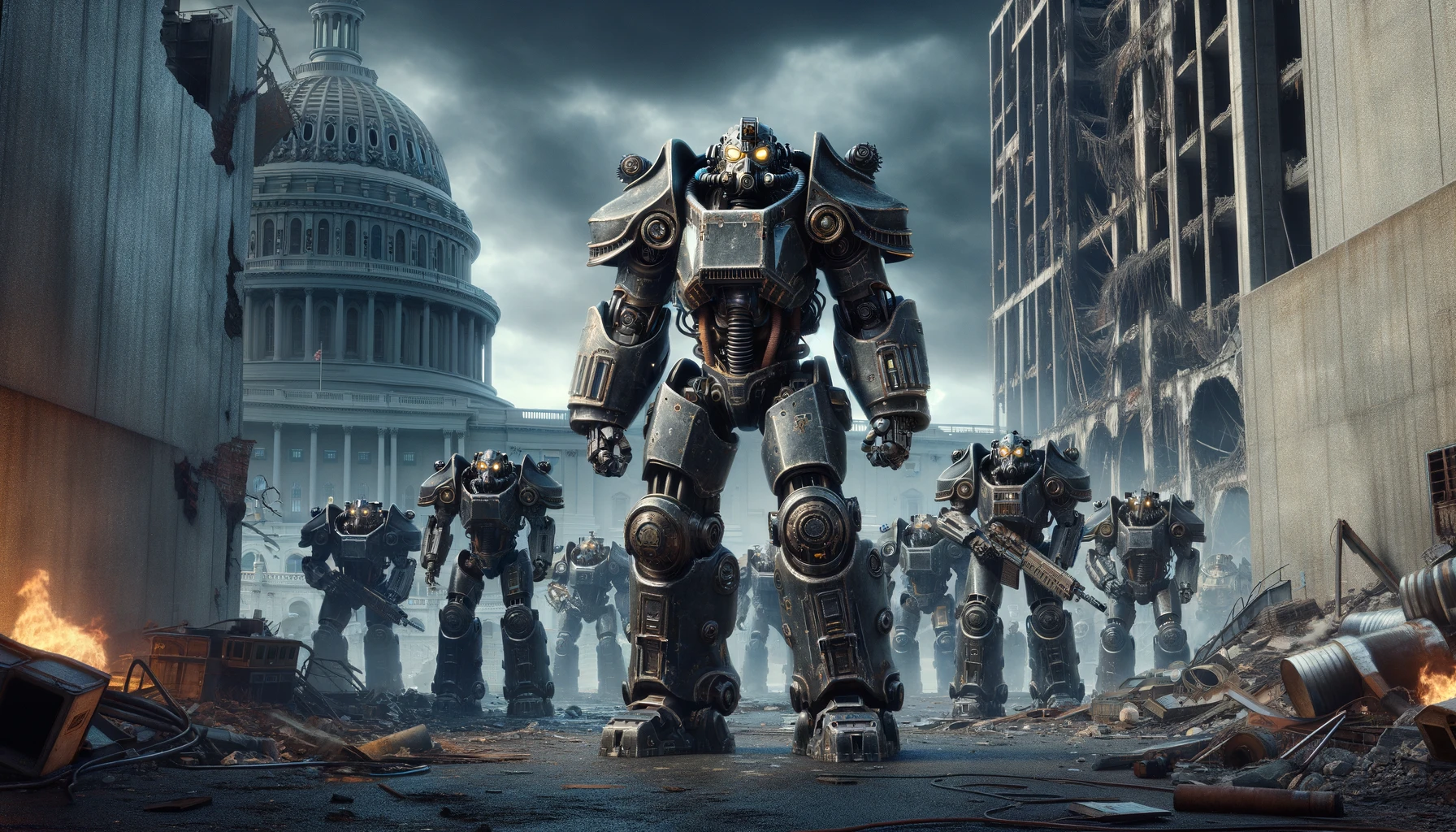It’s OK to Breathe – Sentient AI Isn’t Going to Wipe Out or Enslave Humanity

In both science fiction and contemporary culture, a significant fear has skyrocketed up the list of primary threats to humanity: the approach of the Singularity. This hypothetical moment marks the emergence of Artificial General Intelligence (AGI), when AI attains sentience. The concern is that such sentient AI might rapidly dominate the world, while enslaving or eradicating humanity. Whether driven by malice or a misguided sense of benevolence, the implications for humanity are often portrayed as grim.
From Skynet in Terminator, to the Borg in Star Trek, and even the Kaylon in Seth MacFarlane’s the Orville this is a dominant concern and narrative theme. And it makes a lot of sense. After all, evolutionarily a superior organism possessed of significant competitive advantages tends to supplant or dominate earlier more primitive species. For most of us, when you look at the power and human-like responses coming out of current AI, it’s also easy to assume we’re almost there.
In this post I explain why I’m not worried about a sentient AI taking over the world and enslaving or wiping out humanity and why you really shouldn’t be either.
This post is limited in scope and focuses on addressing this specific side of the AI discussion. It does not attempt to look at the probability, ethics, or potential positive or adverse potential impacts AI may have as it serves as a highly disruptive technological innovation. This includes topics like how humans exploiting AI might amplify their facilitation of terrible outcomes, potential behavioral and reproductive risks, governmental and economic considerations, and the wealth of issues that stem from any incredibly powerful and highly disruptive new technology.
It is important to address concerns I hear regularly over the threat of AGI enslaving or killing us all because it often distracts us from having the more meaningful and pressing conversations, we need to have about how these technologies are shaping society and impacting humanity moving forward.
A quick glossary:
- AGI (Artificial General Intelligence): An essentially sentient AI that can learn, understand and act at a human-like or superior level of intelligence.
- AI (Artificial Intelligence): Initially defined as similar to AGI but now commonly defined to encompass any machine or code that simulates human intelligence with a degree of advanced learning, reasoning, and self-correction.
- AI (Augmented Intelligence): If Artificial Intelligence emulates human intelligence and skillsets, Augmented Intelligence are advanced technologies that supplement human / augment human intelligence. Most current day “AI” is actually augmented, not artificial intelligence.
- Air gapped: The security practice of physically isolating a sensitive network or computer from other public networks such as the internet or power grid.
- LLMs (Large Language Models): A type of AI system that is trained on large data sets in order to understand, create, and manipulate written language at an advanced level.
- Operating System: A piece of software that runs and manages hardware, other pieces of software, and is responsible for core computer services.
- Singularity: A point where technology becomes sentient, typically transition to AGI, is uncontrollable and permanently changes human civilization.

THE AGI APOCOLYPSE
Let’s talk about the singularity/AGI doomsday scenario that many technologists and AI influencers are warning us of. If things play out as many fear – an AGI becomes sentient, has relatively unfettered access to all of the world’s technologies, and then uses that to seize control like a virus. It all happens in a flash (minutes or days), and then with near godlike power the AI not only gains control over every aspect of human civilization, but can use that to carry out a variety of goals which depending on the theory range from stripping of us control and autonomy, to removing humans from the equation to protect the earth, to just wiping us out completely for being violent/abusive/competitive creatures.
Not only do I find this to be a nearly impossible outcome (more on that later), but I lose very little sleep over it. In this type of apocalyptic scenario, humanity is largely eviscerated in a short period of time. Why? Because for this scenario to take place, the process would have to be incredibly accelerated and unfold very similar to other extinction level events such as a planet killing meteor. Something significantly more likely to occur than an AGI-induced human apocalypse.
THE FLAWS
For AGI to achieve supremacy, it would have to achieve that dominance in a lightning quick fashion and, importantly, with 100% efficiency. Both of these are actually radically more difficult – if not impossible – than most people assume.
The old proverb, “fight fire with fire” applies well here. AGI supremacy assumes that a single AGI would attain supremacy and then be able to act. The reality is, that one near universal constant is that the best counter to an emergent threat or power is actually another slightly different version of that same power. We quite literally fight fire with fire, bad guys with good guys, militaries with other militaries, Nukes by empowering other nations with Nukes, viruses with modified viruses, and such.
Even if a single AGI achieved breakout capabilities, there are a wide range of ways to modify that code and combat it with a competing AGI or swarm of modified AGIs. This might result from injecting a virus that causes a fork between the existing breakout AGI. It might be a duplication with modification and enhancement. Or it might be a novel AGI that is equally or more powerful launched in short-order.
Essentially, the derail a super AI, one potential path would quite simply just to cause a fork in it that was advantageous. This is often talked about in sci-fi as the way AI becomes sentient and bypasses safety protocols. But in practice, corruption that is accidental or intentional, in the code is just as likely to be advantageous to humanity. More than that, it also fosters new competing AI, undermining the one-super-AGI-to-rule us all outcome.
INNEFFICIENCY IS OUR ALLY
The creation of deterrent or defensive AGI isn’t improbable in the least. Why? Because a 100% efficient takeover actually isn’t nearly as probable as people make it out to be.
There are a wide range of natural and artificial barriers which significantly slow any potential takeover.
- 1) Technological ecosystems aren’t as uniform as you probably think. There are huge differences that arise from technology ecosystems, national borders, differences in structural preference due to language, cultural approaches, and similar considerations. Even something as seemingly simple as our electrical grid uses a wide variety of different approaches from nation to nation, region to region.
- 2) The premise that computers are all interconnected isn’t accurate. From North Korea, to China, to Turkey, to the US there are significant differences in just how interconnected various networks actually are. Moreover, there are other powerful computing systems that are currently also air gapped and fully siloed off of the wider open internet. Any one of these could be a launching point for a new AGI, or trigger a code fork.
- 3) AI models aren’t uniform. Similar to how different humans have evolved to have different aptitudes, AI models aren’t uniformly good at everything. You just need to look at the recent OpenAI-driven revolution in LLMs. What seemed decades off, and like an insurmountable breakthrough with a major lead has been anything but. OpenAI’s new models have continued to remain competitive, but there has been a veritable explosion in competing solutions that often leapfrog ChatGPT’s capabilities. But when it comes to e.g. Image generation StableDiffusion and Midjourney are AI’s that are much more powerful. Similarly, while ChatGPT has a range of areas where it performs extremely well, alternate approaches and language models/data sets such as Claude, or Gemini, or Perplexity are much better at performing other tasks. For each of these the underlying logic and operating approach is calibrated for different results which is then amplified by the nuances of the data set they use.
To the best of my knowledge, this creates an interesting challenge for any potential super sentient AI. So, not only would any emergent super AI need to overcome the threat of numerous other siloes, AIs, computing resources, and a wide range of computing logics it would also have to simultaneously integrate wildly different supplemental and competing AIs. Many of these may have contradictory behaviors, logics or approaches. Simply shutting down or disabling these is not particularly easy, especially so long as that code sits somewhere and can be re-introduced easily. Meanwhile, integrating and co-opting them into the top-level super intelligence would seem to require certain adjustments to behavior that might have a wide range of adverse impacts. Think of it a bit like a person with a multiple personality disorder where some of those are complimentary, and others are actively combative to the other personalities and their goals. An alternate outcome might be a lords and serfs model, where the super AI just attempts to dominate and control, but not incorporate resulting in a hierarchy of AIs. This type of hierarchy just mirrors standard structures we see in biological organisms and reverts us back to what we already see and have today but with more sophistication.
But, all of this is almost always paired with a very compelling additional fear and concern. Part of the AGI’s process on its path to sentience and the natural result of it achieving that sentience is to grab control of so much data, that it knows everything and is immune to competing forces. Functionally it becomes omniscient, and in so doing, becomes omnipotent.
DATA ISN’T QUITE THE DIFFERENTIATOR YOU THINK IT IS
One of the biggest points of confusion I see in the discussions around data (in general) is the belief that simply having more data leads to better results. At the same time, when there’s talk about training data for LLMs, there’s often an additional conversation about how important a robust and expanded data set is.
For most of us, we think of the information/data that an AI is trained on and has access to as essentially the substance of that AI’s brain and intelligence. But we should be thinking about it more like your computer’s operating system and its hard drive.
Simply dumping more data into a model is only marginally effective beyond a certain point. In the same way if you had a 100GB hard drive, and you swapped that hard drive out with a 150TB hard-drive (~149,900 times larger). Fill both of those with data. And you’ve exponentially increased the information on your PC. But, that does almost nothing to improve the performance or potential outcomes available through you operating system which has to organized, analyze, and make sense of that data. More than that, an operating system that was efficient and capable working with 100GB, may be much slower, much more inefficient, and more easily confused by that incredible expansion in data to 150TB.
Dumping more data in, doesn’t improve the core operating system. It’s adding more data onto a hard drive, but does nothing to improve the version of operating system. This is also what you’re seeing happen with different AI models currently. Here, the AI researchers are basically upgrading, re-writing, or changing the logics of the operating system, while also feeding it more data. Each new operating system + data set, is iterative but also far more competitive. So, at any given time you have a large number of very similar AI models and data sets in close competition and even major breakout moments like OpenAI’s initial release are replaced almost immediately. That fast pace of innovation is part of what makes AI seem so advanced and scary. But, is actually one of the greatest safeguards as well.
My understanding of quantum computing is limited, but this mirrors a key challenge (as I understand it) faced by researchers. Quantum computing itself potentially unlocks nearly instantaneous processing of all the possible outcomes of a certain prompt. Basically, it takes one question, and then gives you all potential answers in parallel. But what it cannot do is combine those questions, contextualize those questions, and evaluate the value and utility of the answer. In this way it needs two different forms of computation. In essence, it requires two different operating systems – an operation decision making brain, and a data analysis brain, because otherwise even with all that access to potential data and answers, there’s no real utility accessible.
DOES THAT MEAN I DON’T BELIEVE THERE’S A THREAT?
Not at all. Technology is always as dangerous as it is empowering and its abuse by bad actors remains a deeply scary threat. But, at the end of the day, if AI plays a role in significantly harming humanity, I continue to believe it will come in the form of amplifying the efficiency of existing human bad-actors. Even if we see true AGI take form, we can expect it to mirror the tribalism and individualism of humanity vs. assuming the role and capabilities of some singular god-like omnipotent power.
It’s important we put in place guardrails, and regulation that helps guide the evolution of these technologies. Just as we do with biomedicine, and the use of any disruptive innovative technology.
There’s plenty to be afraid of. From exploding super volcanoes, to planet killing meteors, to home-grown bioengineered plagues and AI-enhanced totalitarian regimes. Somewhere, way way down that list there’s a grumpy AGI with a god complex. But that’s neither the primary risk that faces us, or one that’s arriving in any meaningful way any time soon.
Ultimately, the future will look quite a bit like the present. Just with new toys to help us achieve the oldest of tasks – to feed ourselves, to protect ourselves, and to help us reproduce. AI? It’s just another accelerant and useful aid in that process, like electricity, air travel, medicine, and air conditioning.
